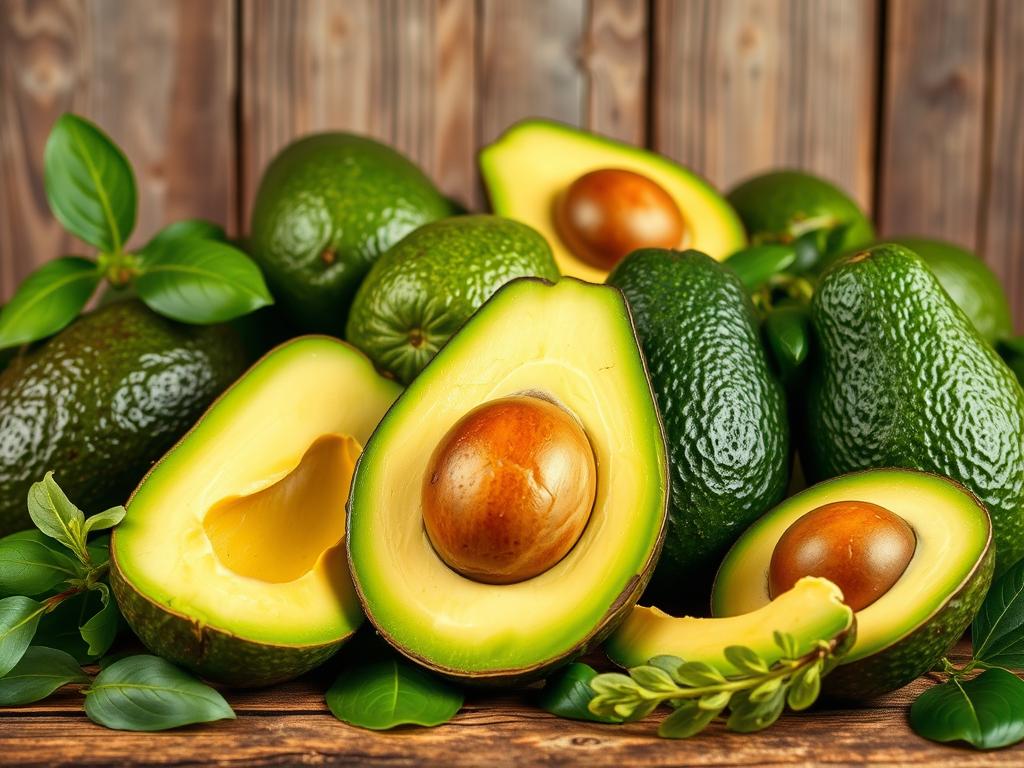Have you ever taken a moment to enjoy the creaminess of a perfectly ripe avocado? Perhaps it’s the simple pleasure of spreading it on toast or tossing it into a salad that brings you comfort. As we navigate our busy lives, sometimes, all we need is a small, nutritious indulgence that not only satisfies our cravings but also supports our well-being. The avocado stands out as a superfood for your health, a delightful way to embrace nature’s bounty while making strides towards better heart health and overall wellness.
In recent years, the popularity of avocados has soared, and for good reason. Packed with essential nutrients, this vibrant fruit offers a unique combination of healthy fats, vitamins, and minerals that contribute to a balanced diet. Embracing avocados in your daily routine can play a vital role in enhancing your health, making it easier to cultivate positive daily habits. So, let’s dive into what makes the avocado truly remarkable and explore the numerous benefits it can offer.
Key Takeaways
- Avocados are rich in healthy monounsaturated fats that promote heart health.
- This versatile superfood is packed with essential vitamins and minerals.
- Incorporating avocados into your diet supports a balanced lifestyle.
- They’re easy to include in meals, encouraging a predominantly plant-based diet.
- Discover more about daily habits that enhance wellness here.
What Makes Avocado a superfood for your health?
Avocados stand out in the realm of superfoods thanks to their impressive nutritional profile. This fruit is recognized for being nutrient-dense, packed with essential vitamins, minerals, and healthy fats. Understanding what makes avocados a nutritional powerhouse sheds light on their many benefits.
Nutritional Profile of Avocado
The nutritional profile of avocados is remarkable. Each fruit contains approximately 7 grams of dietary fiber, which supports digestion and promotes gut health. In addition, avocados boast a variety of essential nutrients, including:
- Vitamin K
- Vitamin E
- B vitamins
- Potassium
- Magnesium
This combination of nutrients makes avocados a highly valuable addition to a balanced diet. Their richness in antioxidants also aids in fighting free radicals, offering further health benefits.
Vitamins and Minerals Found in Avocados
Vitamins and minerals found in avocados play crucial roles in maintaining overall health. For example, Vitamin K is important for bone health, while potassium helps regulate blood pressure. These vital nutrients contribute to the fruit’s reputation as a superfood. Individuals seeking to enhance their dietary choices can benefit from incorporating avocados into their meals for a nutrient boost.
Healthy Fats: The Heart Benefits
Avocados are well-known for their content of healthy fats, particularly monounsaturated fats. These fats play a significant role in lowering bad cholesterol levels, supporting heart health. They provide a substantial source of energy while promoting a feeling of fullness, making them an excellent option for those looking to manage their weight. In fact, including avocados in your diet can lead to improvements in overall cardiovascular health.

In summary, the blend of their nutritional profile, vitamins, minerals, and heart-healthy fats positions avocados as a top superfood. For those interested in maximizing their health, understanding how to use these nutrient-rich ingredients in daily meals is essential. You can explore more about balanced diets for birds by visiting this link, which discusses understanding nutritional needs.
Health Benefits of Avocado Consumption
The consumption of avocados offers numerous health benefits that can enhance overall well-being. Regular intake promotes a variety of physiological advantages, particularly in areas like heart health, digestive wellness, and weight management. Understanding these benefits helps one make informed dietary choices.
Boosting Heart Health
Avocados significantly contribute to heart health through their unique combination of healthy fats and nutrients. Rich in monounsaturated fats, they support the reduction of bad cholesterol levels, thereby lowering the risk of heart disease. Studies suggest that the regular inclusion of avocados in a balanced diet correlates with enhanced cardiovascular health, making them an important component for those focused on maintaining a healthy heart.
Enhancing Digestive Wellness
Another remarkable advantage of avocados lies in their high content of dietary fiber. This nutrient plays a crucial role in enhancing digestive wellness. Fiber aids in promoting regular bowel movements, reducing the risk of constipation, and contributing to overall gut health. Individuals seeking to improve their digestive function can greatly benefit from incorporating avocados into their meals.
Supporting Weight Management
Avocado benefits extend to weight management as well. The presence of healthy fats in avocados fosters a sense of fullness, which can help curb unhealthy snacking and reduce overall calorie intake. Research indicates that including avocados in a weight management plan can lead to better control over eating habits, thereby supporting healthier lifestyle choices.

Through outdoor activities, families can embrace a balanced lifestyle that includes nutritious foods. For more insight, consider exploring various engaging outdoor sports that promote family bonding while enhancing physical fitness, as detailed on this website.
How to Incorporate Avocado into Your Diet
Integrating avocado into your meals can enhance both flavor and nutritional value. This superfood is rich in healthy fats and can be included in a variety of dishes. Discover some delicious avocado recipes that will delight your taste buds while providing essential nutrients.
Delicious Avocado Recipes
Avocados can shine in multiple recipes. From classic guacamole to zesty avocado salads, the options are endless. Here are a few popular avocado recipes:
- Guacamole: A staple dip made by mashing ripe avocados and mixing them with lime juice, tomatoes, onions, and spices.
- Avocado Toast: Spread ripe avocado over whole-grain toast and top with a poached egg, salt, and red pepper flakes for a nutritious breakfast.
- Avocado Salad: Combine diced avocados with mixed greens, grilled chicken, and a light vinaigrette for a refreshing meal.
Simple Snack Ideas
Incorporate avocados into your snacks for a burst of flavor and nutrition. These easy snack ideas highlight the versatility of avocados:
- Whole-grain crackers topped with mashed avocado and fresh herbs.
- Avocado wraps filled with turkey, spinach, and a smear of hummus.
- Sliced avocado paired with cherry tomatoes and balsamic glaze for a quick treat.
Avocado Smoothies and Spreads
For a refreshing drink or spread, avocado can be blended into delicious smoothies or transformed into creamy spreads. Avocado smoothies offer a delightful way to enjoy healthy fats:
- Banana Avocado Smoothie: Blend ripe avocado with bananas, spinach, almond milk, and a scoop of protein powder for a nutritious breakfast or post-workout snack.
- Chocolate Avocado Smoothie: Combine avocados with cacao powder, honey, and coconut milk for a decadent yet healthy drink.
Experimenting with avocados not only diversifies your meals but also contributes to a balanced diet filled with healthy fats. Whether through savories or smoothies, there’s always a way to enjoy this amazing fruit.
Misconceptions About Avocados
Despite their rising popularity, many misconceptions about avocados continue to circulate. One of the most persistent common myths is that avocados are unhealthy due to their caloric content. This notion leads to unnecessary avoidance of a nutritious food that offers numerous health benefits. Addressing these misunderstandings is vital for a more informed approach to healthy eating.
Common Myths Debunked
A prevalent myth is that avocados are solely a source of fat, leading some to believe they should eliminate them from their diets. In reality, the fat found in avocados is predominantly monounsaturated, promoting heart health. Another misconception is that consuming avocados will lead to weight gain. In moderation, avocados can actually support weight management, as their healthy fats contribute to satiety and nutrient absorption.
Understanding Avocado’s Caloric Content
The caloric content of avocados is often exaggerated, contributing to negative perceptions. A standard serving of avocado contains approximately 80 calories. This amount is quite moderate compared to other snack options which can be similarly high in calories without providing significant nutritional benefits. When integrated into a balanced diet, the caloric content of avocados aligns well with their health-boosting properties.

Choosing and Storing Avocados
Understanding how to select ripe avocados is essential for enjoying this nutritious fruit at its peak flavor and texture. When shopping for avocados, look for those that have a slightly soft touch when gently squeezed, indicating ripeness. The color can also provide clues; ripe avocados are usually darker, but this can vary by variety. Additionally, check the stem area for a slight indentation—if it reveals bright green flesh underneath, the avocado is ready to be enjoyed.
How to Select Ripe Avocados
To ensure you choose the best avocados, avoid any that feel overly mushy or have large dark spots, as these can indicate overripeness or spoilage. It’s also wise to buy a few avocados at different stages of ripeness. This way, you’ll always have one ready to eat while others are ripening at home.
Ways to Keep Avocados Fresh
Once you’ve selected your avocados, knowing how to store them properly is crucial. If you’ve cut an avocado and want to keep it fresh, use lemon juice or vinegar to coat the exposed flesh—this helps slow down the browning process. Another effective method involves storing the half with a piece of onion, as the gases from the onion can prevent oxidation. By following these tips, you can maximize the shelf life of your avocados and enjoy their health benefits without waste.











